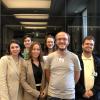News
Displaying Results 26 - 50 of 111
To address the conclusions of the review of the amended Protocol to Abate Acidification, Eutrophication and Ground-Level Ozone (Gothenburg Protocol), as adopted by the Executive Body to the UNECE Convention on Long-range Transboundary Air Pollution in December 2022, further work is currently being…
Countries in the Eastern Europe and South Caucasus (EESC) sub-region (Armenia, Azerbaijan, Georgia, the Republic of Moldova, and Ukraine) must boost their efforts to diversify and upgrade their economies through innovation for long-term, sustainable growth and resilience, in light of recent crises…
According to the UNECE Smart Sustainable Cities profile for Tbilisi, presented today in the capital of Georgia, the city has made important efforts in implementing the 2030 Agenda for Sustainable Development, capitalizing on the growth opportunities generated by the Association Agreement between…
Young people across the Pan-European region are driving change for a sustainable future and will be key actors to get countries on track for the implementation of the 2030 Agenda. Their role is also integral to the huge potential of education to build knowledge, skills and understanding to tackle…
Research on and monitoring of the effects of air pollution on different environmental media and health has been carried out for more than four decades under the UNECE Convention on Long-range Transboundary Air Pollution. The data and research that has emerged from these efforts is unique as it…
Air pollutants are not only harming human health and the environment but are also degrading surfaces of historical buildings and monuments. Corrosion and soiling of cultural heritage sites as a result of air pollution can lead to severe economic losses as a result of high maintenance and…
The massive use of fertilizers and the production and use of manure in agriculture over the past 100 years have led to significant reactive nitrogen emissions to air and releases to water and land. Burning of fossil fuels (in vehicles, power plants and industry) is another source of reactive…
A recent study published in The Lancet found that almost the whole world's population was exposed to unsafe levels of air pollution in 2019, with only a mere 0.001 percent breathing air that contains fine particulate matter (PM2.5) at concentrations lower than what the World Health Organization…
What are emission inventories and what purpose do they serve? Why is it important to develop emission inventories? If you don’t know the answer to these questions, you might be interested in taking the e-learning course on How to report emissions under the Convention on Long-range Transboundary Air…
While the impacts of air pollution on vegetation and crops are sometimes overlooked, they can take a high toll on food production. As the food and energy crises have recently shown the vulnerability of our food systems, the impacts of air pollution on agricultural yields and food production should…
Standards touch nearly every aspect of our daily life through all the products that we use and consume each day (for example, mobile phones, vehicles, cleaning products, personal protection equipment, toys, and others). When they are produced or introduced on the market, products are checked for…
It is critical that construction industry’s general contractors, architects and governments find ways to innovate and incorporate minimum efficient standards and innovations, such as architectural upcycling and recycling, through proper and updated legislative frameworks and rules as well as…
With climate and biodiversity loss heading the news these days, another problem related to the planet we all share is often forgotten: air pollution. Air pollution has an enormous burden on public health, ecosystems, climate, and ultimately, the economy. Globally, the World Health Organization (…
Technologies can enhance commerce if clear international standards are in place to ensure that their use is harmonized between trading partners, and if there is regulatory coherence among countries.
Ways in which digital and green transformations can improve quality infrastructure for trade in…
Premature mortality attributable to poor air quality results in high costs. For example, a study by WHO and OECD estimates that in 2010 costs of air pollution related premature deaths in Georgia were at about 9 billion USD. The main sources of air pollution are the transport and agricultural…
Standards are in everything that surround us. Just the mobile phone in your pocket uses hundreds of standards, from the cellular network and the cable connectivity to physical elements such as the processing chips and the LED screen, not to mention security testing and the process design. We rely…
The importance of clean air for the quality of our lives has recently been recognised by the United Nations General Assembly. What is more is that in the General Assembly session at the end of July, Member States overwhelmingly adopted a resolution recognising that a clean, healthy and sustainable…
As Ministers from across the UNECE region gather in the Cypriot capital of Nicosia to outline new initiatives to work towards a sustainable and ecological future at the 9th Environment for Europe Conference (5-7 October), the final report on the Batumi Action for Cleaner Air (BACA), adopted 6 years…
Addressing the triple planetary crisis of climate disruption, pollution and nature loss, requires an innovative approach to financing as a way to rapidly and systemically address these interlinked issues. Public-Private Partnerships (PPPs) offers a financing mechanisms for infrastructure projects…
Governments, Mayors, leading architects, urbanists and experts will gather in San Marino on 3-6 October 2022 for the 83rd session of the UNECE Committee on Urban Development, Housing and Land Management. The session will support regional exchange of experiences and good practices to promote…
With the review of the amended Protocol to Abate Acidification, Eutrophication and Ground-Level Ozone (Gothenburg Protocol) about to enter its final round, expert groups under the UNECE Air Convention are now discussing latest findings to assess the effectiveness of measures.
The amended Protocol…
All too often we take the air we breathe and share for granted. Only when we breathe very polluted air, when we can smell and see the pollution, do we realize that the air around us is a precious good that needs to be protected, much like the water we drink. On the International Day of Clean Air…
UNECE is supporting the Government of Moldova in its efforts to enhance its national innovation system to accelerate progress towards Sustainable Development. During the online meeting on 16 June, the two sides agreed to develop a Roadmap for Innovation and Technology Transfer, which will feed into…
Transport continues to be a significant source of air pollution, especially in cities in the UNECE region. Air pollutants, such as particulate matter (PM) and nitrogen dioxide (NO2), harm human health and the environment. Although air pollution from transport has decreased in the last decade…
The UNECE region is not on track to meet the Sustainable Development Goals (SDGs) by 2030. Public procurement can be a powerful policy lever to accelerate progress. Some Governments in the UNECE region spend as much as 20 percent of GDP annually on procuring goods, services, and infrastructure.…


























